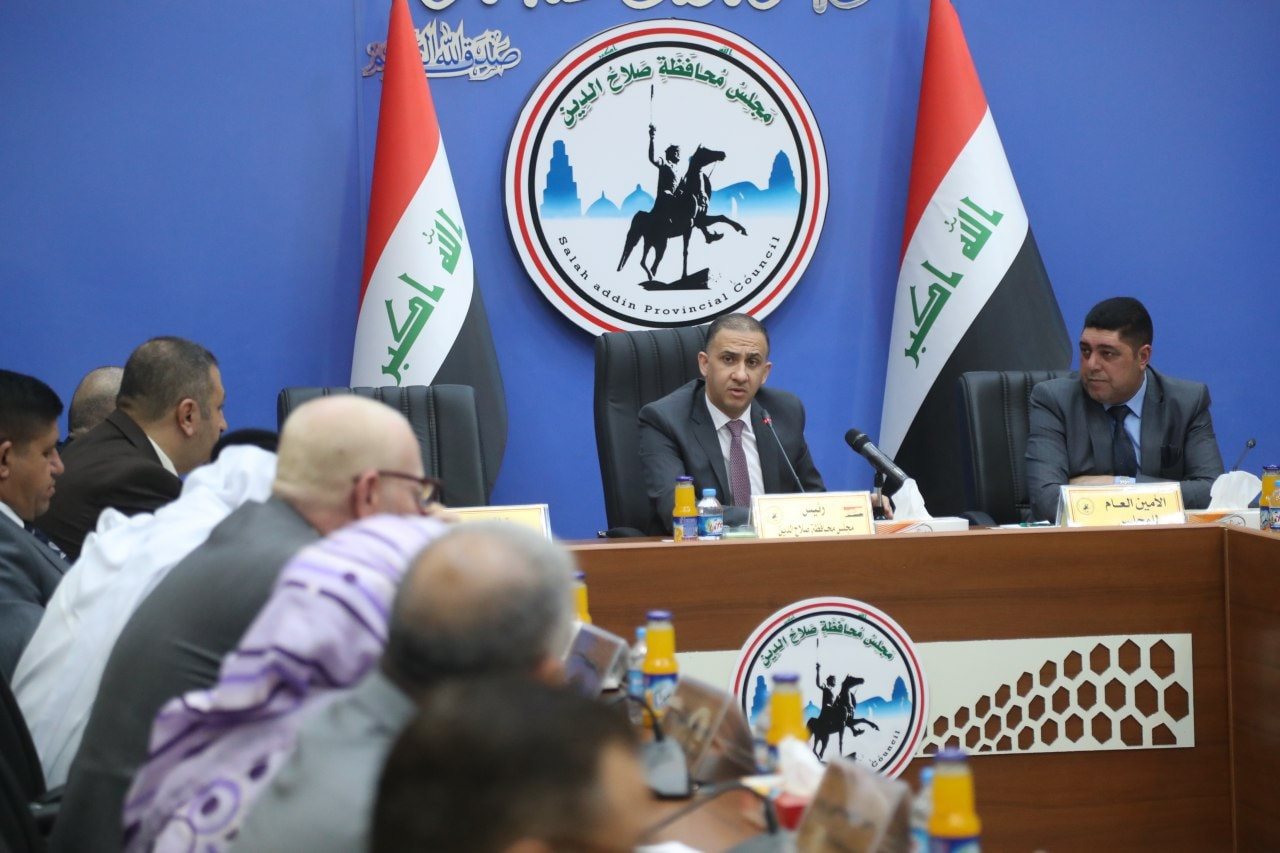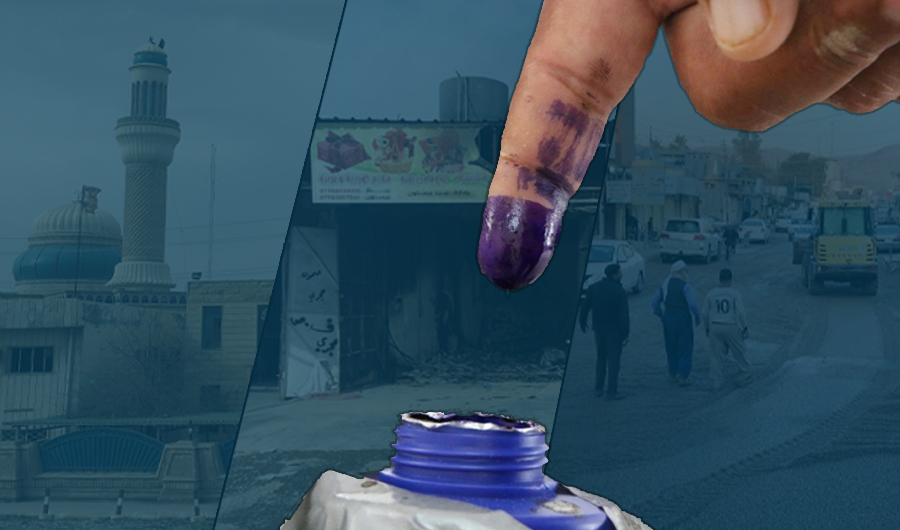While the number of Kurdish voters in Salahaddin is less than 40,000, Kurdish parties have not agreed among themselves and joined Arab coalitions separately to win at least the only seat in the provincial council through three candidates.
According to KirkukNow, the Patriotic Union of Kurdistan (PUK), the Kurdistan Democratic Party (KDP) and the Kurdistan Communist Party (KCP) have one candidate each within the framework of three Arab coalitions for the Salahaddin provincial council elections.
Two other Kurdish candidates are likely to contest outside the Kurdish parties but under the umbrella of Arab parties.
Hassan Mohammed, a former member of the Salahaddin provincial council and deputy head of the Hamrin headquarters of the PUK, told Kirkuk Now, “At first, we had four candidates but later we led a poll so that the votes we get will not be scattered."
According to the results of the poll, the PUK has left only one candidate in the Kurdish areas of Tuz Khurmatu competing for a seat in the Salahaddin provincial council within the framework of the National Popular List.
The PUK official stressed that they have met three times with the Kurdish parties to unite their candidates and not lose the Kurdish vote, but to no avail.
Let it remain for history, we tried for Kurdish unity in Tuz Khurmatu
The number of Kurdish voters in Salahaddin, according to unofficial figures from Kurdish parties, is less than 40,000 out of 154,000 inhabitants of the entire district of Tuz Khurmatu (according to the Iraqi Statistical Agency), the only disputed area of Salahaddin, home for Kurds, Turkmen and Arabs.
The multi-ethnic district of Duz Khurmatu, located 70 kilometers south of Kirkuk and part of Salahaddin province, is the only disputed town of the province and one of the disputed territories between Erbil and Baghdad, home to 150,000 Turkmens, Kurds and Arabs.
The predominantly Sunni province of Salahaddin, about 135 kilometers north of the Iraqi capital, once home for Saddam Hussein, is under the control of Iraqi Security Forces ISF including the Shia-led paramilitary forces known as al-Hashid al-Shabi, the Popular Mobilization Forces PMF.
Following the toppling of Saddam Hussein in 2003, the Kurdish political parties, in particular the PUK had an upper hand in the area up to October 16, 2017 when the Iraqi Security Forces ISF with support of PMF took control of Tuz and the rest of the disputed territories which extends from Khanaqin, east of Baghdad on the borders with Iran up to Shingal (Sinjar) in Nineveh Province, in the far west on the borders with Syria.

The disputed territories consist of 14 administrative units, districts and sub-districts, spread across the 4 governorates of Kirkuk, Nineveh, Diyala and Salahaddin in northern and middle Iraq.
Rich in natural resources and strategically located, many of these territories are also ethnically and religiously diverse, forming the historical home for different communities including Chaldo-Assyrian Christians, Ezidis (Yazidis), Shabaks, Turkmens, Arabs, Kurds, Kaka’is and others.
In the Ba’ath era, many of these communities were subjected to Arabization campaigns, which attempted to change the demographic composition of the area. These injustices continue to have an effect on relations between communities today.
"We will participate in the elections with a female candidate with the National Decision Coalition," Bakhtiar Hijran, head of the KDP office in Tuz Khurmatu, told KirkukNow.
The National Decision Coalition includes more than 10 Sunni Arab political parties.
"We had an initiative to participate in the Kurds with a single list, but the PUK was not ready," he said. "The lack of unity and multiple candidates will create division and will not benefit any party and citizens.
In 2019, when there were rumors of provincial council elections, Kurdish parties agreed after several meetings to participate with only one female candidate in Salahaddin to secure a provincial council seat.
Kurds held the post of Tuz Khurmatu district commissioner for many years, yet following the events of October 16, 2017, they lost that post and many other senior security and administrative posts, some of the residents of the Kurdish neighborhoods were internally displaced and have not yet returned.
Hassan Mohammed believes that the number of Kurdish candidates in Salahaddin reaches five candidates, in addition to the PUK, PDK and Communist, some people close to Hashdi Shaabi have nominated a female candidate and another group as protesters within the PUK want to have candidates. "It is bad for Kurdish morale and it is bad for the media. Even if anyone burns two hundred votes, it is still harmful. The reason for our lack of unity is the division within the Kurdish homeland."
In the October 2021 parliamentary elections, the Kurds won a seat in Salahaddin province (Tuz Khurmatu constituency) for the first time with more than 12,000 votes win a seat.
"We have a male candidate within the framework of the Civil Values. What is clear now is that we, the PUK and KDP have their candidates, but it is not clear whether the other parties will participate or not," Sabah Juma of the KCP told KirkukNow.
The Civil Values Coalition is an umbrella for over 10 Sunni Arab parties.
The Gorran Movement will not participate in the provincial council elections, Nawa-i-Nwe (New Generatio) will participate only in Kirkuk and other parties, while the Islamic Union have not mentioned the nomination of a candidate for Salahaddin.
The next provincial council of Salahaddin, elections schedule on December 18, will consist of 15 seats, four of which will be reserved for women, according to the population (over 1.6 million people) and based on the latest amendments to the electoral law of the Iraqi parliament and provincial councils.
The Iraqi provincial councils were dissolved at the end of 2019 under the second amendment to the provincial council elections law, which was one of the demands of Tishreen (October 2019) protesters in Baghdad and several other provinces against corruption, left hundreds of civilians killed and thousands injured.
There are about five Kurdish candidates in Salahaddin, which will undoubtedly divide the Kurdish vote
The Communist Party official said they have met with the parties more than once to unite, but unfortunately this has not been done and the parties have nominated separate candidates leading to the division of the Kurdish voice.
In the 2013 Salahaddin provincial council elections, Kurdish parties won only one seat out of 29 seats under the Brotherhood and Coexistence Coalition. In the 2009 provincial council elections, the Kurds won two out of 28 seats with the Brotherhood and Peace Coexistence list.
The PUK has earned one seat of Tuz Khurmatu in 2021 General Elections. In May 2018, six Kurdish nominees from different lists and alliances could not make it to the Iraqi parliament put of 12 parliamentary seats Salah al-Din province. The PUK has earned 17,000 votes in 2014 elections yet could not win a seat, which dropped into less than 5,000 votes in 2018 elections.
The KDP boycotted 2018 elections in the disputed territories following October 2017 events when Iraqi forces launched "Law imposing" process which ousted Kurdish parties and the Peshmerga from the positions they controlled following emergence of Islamic State in Iraq and Syria ISIS in 2014.





